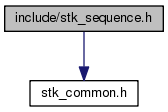|
The Sequence Toolkit
www.sequence-toolkit.com |
|
The Sequence Toolkit
www.sequence-toolkit.com |
#include "stk_common.h"

Go to the source code of this file.
Macros | |
| #define | STK_SEQUENCE_ID_INVALID 0 |
| #define | STK_SEQUENCE_TYPE_INVALID 0 |
| #define | STK_SEQUENCE_TYPE_DATA 1 |
| #define | STK_SEQUENCE_TYPE_KVPAIR 2 |
| #define | STK_SEQUENCE_TYPE_MGMT 3 |
| #define | STK_SEQUENCE_TYPE_REQUEST 4 |
| #define | STK_SEQUENCE_TYPE_QUERY 5 |
| #define | STK_SEQUENCE_TYPE_SUBSCRIBE 6 |
| #define | STK_SEQ_TYPE_TO_STRING(_type) |
Typedefs | |
| typedef stk_uint64 | stk_sequence_id |
| typedef stk_uint16 | stk_sequence_type |
| typedef stk_uint16 | stk_generation_id |
| typedef void * | stk_sequence_metadata_t |
| typedef struct stk_sequence_stct | stk_sequence_t |
| typedef struct stk_sequence_iterator_stct | stk_sequence_iterator_t |
| typedef stk_ret(* | stk_sequence_cb )(stk_sequence_t *seq, void *data, stk_uint64 sz, stk_uint64 user_type, void *clientd) |
This header provides the typedefs and definitions required to interface to the Sequence module APIs
| #define STK_SEQ_TYPE_TO_STRING | ( | _type | ) |
Macro to ease mapping of types to strings
| #define STK_SEQUENCE_ID_INVALID 0 |
Definition of an invalid Sequence ID
| #define STK_SEQUENCE_TYPE_DATA 1 |
Sequence is a Data sequence
| #define STK_SEQUENCE_TYPE_INVALID 0 |
Invalid Sequence - never used
| #define STK_SEQUENCE_TYPE_KVPAIR 2 |
Sequence is set of Key Value Pairs
| #define STK_SEQUENCE_TYPE_MGMT 3 |
Sequence is Management data
| #define STK_SEQUENCE_TYPE_QUERY 5 |
Sequence is a query (read only request)
| #define STK_SEQUENCE_TYPE_REQUEST 4 |
Sequence is a request
| #define STK_SEQUENCE_TYPE_SUBSCRIBE 6 |
Sequence is a subscription (persistent request)
The generation ID is a 16 bit unsigned number and is used to manage uniqueness of the sequence. For example, data flow modules will bump the generation each time a sequence is sent ensuring each sequeunce sent is uniquely identifed.
| typedef stk_ret(* stk_sequence_cb)(stk_sequence_t *seq, void *data, stk_uint64 sz, stk_uint64 user_type, void *clientd) |
The callback signature to be used for functions being passed to stk_iterate_sequence()
A Sequence ID is a 64 bit unsigned number.
This defines an iterator to step through each data element in a sequence
Sequences can store data and meta data. This is the type used to manage meta data. [Meta data is not yet implemented]
This is the Sequence object
A Sequence Type defines the type of data contained in the sequence. This is largely left for user usage, though STK defines some typical types.